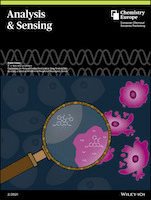
Analysis & Sensing
metrics 2024
Exploring Innovative Techniques in Chemistry
Introduction
Analysis & Sensing is a prominent academic journal published by WILEY-V C H VERLAG GMBH, focusing on the critical fields of Analytical Chemistry, Electrochemistry, Spectroscopy, and Biochemistry. Established within the converged years from 2021 to 2024, the journal aims to advance knowledge in analytical and sensing techniques, providing a platform for high-quality research that reflects current trends and challenges in the scientific community. With a Scopus ranking that highlights its credibility—ranking 101st in Analytical Chemistry and 43rd in Electrochemistry—the journal caters to researchers, professionals, and students striving to enhance their understanding of analytical processes and methodologies. Although not open access, the quality of the articles published ensures a rigorous peer-review system, making it a vital resource for those who wish to remain at the forefront of research innovation in analytical sciences. Additionally, its global reach, indicated by its effective dissemination and relevance, underscores the journal's significance within the realm of chemical research.
Metrics 2024
 -
- 3.40
3.40 3.40
3.40 -
-Metrics History
Rank 2024
Scopus
IF (Web Of Science)
JCI (Web Of Science)
Quartile History
Similar Journals

MICROCHEMICAL JOURNAL
Driving Methodological Excellence in ChemistryMicrochemical Journal, published by Elsevier, stands as a leading scholarly publication in the fields of Analytical Chemistry and Spectroscopy, boasting impressive rankings of Q1 and Q2 in their respective categories for 2023. With an H-index reflecting its substantial impact and relevance, this journal has been a cornerstone of research dissemination since its inception in 1957, and it continues to play a vital role in advancing the methodological and technological innovations within these disciplines. The journal presents peer-reviewed articles that explore a wide array of topics, making it an essential resource for researchers, professionals, and students keen on the latest advancements in microchemical processes and techniques. Although it does not currently offer open access options, its publication through Elsevier ensures a high standard of academic integrity and wide accessibility through various academic institutions. With a strong Scopus ranking—9th in Chemistry Spectroscopy and 22nd in Analytical Chemistry—Microchemical Journal is an indispensable platform for empirical studies, insightful reviews, and pioneering methodologies in the microchemical domain.

MICROCHIMICA ACTA
Advancing Analytical Chemistry Since 1926Microchimica Acta is a prestigious journal in the field of Analytical Chemistry, published by Springer Wien. With a history spanning nearly a century, since its inception in 1926, this journal continues to play a significant role in advancing chemical research, currently ranking #18 out of 156 in its category according to Scopus, placing it within the top 88th percentile. Microchimica Acta publishes high-quality, peer-reviewed articles that cover a diverse range of topics in analytical techniques, instrumentation, and methodologies. Researchers and professionals alike benefit from its comprehensive scope, which fosters innovation and knowledge-sharing in the analytical chemistry community. Despite its non-open-access model, the journal is committed to disseminating critical findings that drive progress in academia and industry, ensuring its relevance in a continually evolving field. As an essential resource, Microchimica Acta not only contributes significantly to scholarly discourse but also provides a platform for emerging concepts and practices in the analytical landscape.
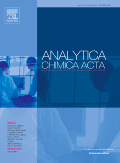
Analytica Chimica Acta
Exploring the depths of analytical methodologies since 1947.Analytica Chimica Acta is a prestigious peer-reviewed journal published by ELSEVIER, renowned for its significant contribution to the fields of analytical chemistry, biochemistry, environmental chemistry, and spectroscopy. Established in 1947, this journal has solidified its reputation, reflected in its impressive impact factors and Scopus rankings, including a Q1 classification in Analytical Chemistry and Spectroscopy, and a Q2 ranking in both Biochemistry and Environmental Chemistry. With its comprehensive scope, Analytica Chimica Acta aims to publish innovative research, critical reviews, and technical notes that advance the understanding and application of analytical methods. As an essential resource for researchers, professionals, and students alike, it encourages the dissemination of high-quality research that addresses contemporary challenges in chemical analysis and promotes interdisciplinary collaboration. While the journal operates primarily on a subscription basis, it also offers unique opportunities for authors to reach a broad audience and engage in the global scientific discourse.

Analytical and Bioanalytical Chemistry Research
Bridging Disciplines in Analytical and Bioanalytical Chemistry.Analytical and Bioanalytical Chemistry Research is an esteemed open-access journal published by the Iranian Chemical Society, dedicated to the advancement of knowledge in the fields of analytical chemistry, biochemistry, and spectroscopy. Since its inception in 2014, this journal has provided a platform for researchers, professionals, and students to publish and access high-quality research articles that contribute to the understanding of chemical analysis and bioanalytical methods. With an ISSN of 2383-093X and an open-access model that promotes global dissemination of findings, it ensures that innovative research reaches a broad audience. The journal has consolidated its presence in the scientific community, currently ranked in quartile Q4 for analytical chemistry, biochemistry, and spectroscopy as of 2023. Its Scopus rankings, including a percentile of 34th in Analytical Chemistry, reflect its commitment to quality research and scholarly contribution. Situated in Tehran, Iran, the journal serves as a vital resource for academic discourse, offering insights into emerging trends and methodologies in analytical and bioanalytical chemistry.
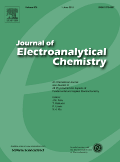
Journal of Electroanalytical Chemistry
Exploring New Horizons in Electroanalytical MethodologiesThe Journal of Electroanalytical Chemistry, published by Elsevier Science SA, stands as a leading platform for the dissemination of cutting-edge research in the field of electroanalytical science. With an impressive impact factor that reflects its esteemed reputation—ranking in the Q1 category for both Analytical Chemistry and Chemical Engineering, alongside a strong presence in Electrochemistry—this journal provides a vital resource for researchers, professionals, and students alike. Covering topics from fundamental electrochemical processes to innovative analytical techniques, the journal aims to foster an in-depth understanding and discussion of contemporary advancements in electroanalytical methodologies. Operating under a model that prioritizes quality and rigor, it facilitates access to high-quality manuscripts and reviews that contribute to the advancement of the field. For over six decades, from 1959 to 2024, it has played an intrinsic role in shaping the landscape of electrochemistry, continually driving forward the frontiers of knowledge and application.

SENSORS AND ACTUATORS B-CHEMICAL
Advancing the Frontiers of Sensor Technology.SENSORS AND ACTUATORS B-CHEMICAL, published by ELSEVIER SCIENCE SA, is a premier scientific journal that occupies a vital niche in the field of materials science and engineering. With an impressive impact factor and ranking in the Q1 category across multiple disciplines, including Condensed Matter Physics, Electrical and Electronic Engineering, and Materials Chemistry, this journal is recognized as a leading source of innovative research and developments in sensor technologies and their chemical applications. The journal disseminates high-quality articles with a focus on the design, fabrication, and application of sensors and actuators, promoting valuable insights that cater to researchers, professionals, and students alike. As a testament to its scholarly significance, SENSORS AND ACTUATORS B-CHEMICAL remains pivotal for those seeking to advance their understanding of electronic, optical, and magnetic materials. The journal is accessible primarily through subscription, ensuring a wide reach to the academic community, and contributing significantly to the ongoing exploration and interdisciplinary collaboration in this dynamic field.
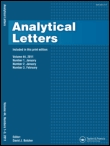
ANALYTICAL LETTERS
Transforming the Landscape of Analytical ChemistryANALYTICAL LETTERS is a reputable journal published by Taylor & Francis Inc, focusing on the dynamic fields of analytical chemistry, biochemistry, and clinical biochemistry. With an ISSN of 0003-2719 and an E-ISSN of 1532-236X, the journal has been a platform for scholarly articles since its inception in 1967, and is set to continue its contribution to the scientific community until 2024. Despite its classification in Q3 across various categories as of 2023, including analytical chemistry and spectroscopy, ANALYTICAL LETTERS maintains a significant impact within its field, evidenced by its moderate rankings within Scopus. This journal serves as a vital resource for researchers and professionals seeking to explore recent advancements in analytical methodologies, instrumentation, and applications, facilitating the dissemination of critical insights in laboratory practices. With access primarily through institutional subscriptions, it remains positioned as a crucial tool for those advancing knowledge and innovation in analytical sciences.

SENSORS
Illuminating the path of sensor technology evolution.SENSORS is a leading peer-reviewed open-access journal published by MDPI, dedicated to the field of sensor technology and its applications. Established in 2001 and located in Basel, Switzerland, this journal plays a pivotal role in disseminating groundbreaking research encompassing various disciplines, including Analytical Chemistry, Physics, Engineering, and Biochemistry. With a distinguished 2023 Scopus ranking that places it in Q1 across multiple categories and a commendable impact factor reflective of its high-quality contributions, SENSORS has cemented its status as an essential resource for researchers and professionals alike. The journal is committed to facilitating knowledge exchange in cutting-edge sensor technologies, fostering advancement in areas such as instrumentation, medical applications, and electronic engineering. The convenient open-access model ensures that research findings are readily accessible to a global audience, promoting collaboration and innovation within the scientific community. For all those interested in probing the depths of this dynamic field, SENSORS provides a rich repository of research that not only informs but inspires future explorations.
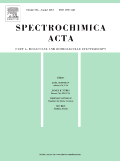
SPECTROCHIMICA ACTA PART A-MOLECULAR AND BIOMOLECULAR SPECTROSCOPY
Showcasing authoritative research in the realm of spectroscopy.SPECTROCHIMICA ACTA PART A-MOLECULAR AND BIOMOLECULAR SPECTROSCOPY, published by PERGAMON-ELSEVIER SCIENCE LTD, stands as a pivotal resource in the fields of molecular and biomolecular spectroscopy, providing a platform for researchers to disseminate significant findings from both analytical chemistry and molecular physics. With an impactful presence reflected in its Q2 rankings across several categories, including Analytical Chemistry and Spectroscopy, this journal aims to foster advancements in the understanding of molecular interactions through innovative spectroscopic techniques and methodologies. Despite not providing open access, its authoritative articles are crucial for professionals seeking to stay at the forefront of research and development in the discipline. The journal also showcases an impressive pedigree, ranked in the top tiers of Scopus indicators, including high percentiles in both Chemistry and Physics domains. With coverage expanding from 1995 to 2025, SPECTROCHIMICA ACTA PART A remains an essential reading for anyone dedicated to the evolution of spectroscopic science.

Journal of Analysis and Testing
Innovative insights in analytical chemistry and testing.Journal of Analysis and Testing is a premier academic journal published by SPRINGER SINGAPORE PTE LTD, dedicated to advancing the fields of analytical and environmental chemistry. With ISSN 2096-241X and E-ISSN 2509-4696, the journal has established a significant presence since its inception in 2017, converging its focus until 2024. The journal's outstanding rankings in 2023, including Q1 quartile placements in Analytical Chemistry, Instrumentation, and Spectroscopy, underscore its pivotal role in disseminating high-quality research. Researchers can access cutting-edge studies that explore innovative testing methodologies, electrochemical analyses, and material evaluations, making it an essential resource for professionals and students alike. The Journal of Analysis and Testing not only celebrates advances in science and technology but also promotes interdisciplinary collaborations, ensuring widespread impact across analytical and environmental domains. As such, this journal plays a vital role in shaping the future of analytical practices and methodologies, positioning itself as a key conduit for knowledge exchange in the scholarly community.